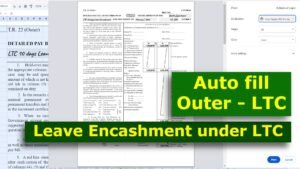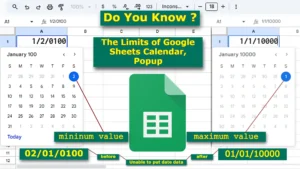
In December, mostly departments review the income tax details of their salaried employees to ensure that they do not face any difficulties while filing their Income Tax Returns (ITR) at the end of the financial year. This involves calculating the total gross income and deducting taxes based on the tax regime—Old or New—chosen by each employee.
Need to Know?
Remember the Budget 2020, a new tax regime was introduced with revised tax slabs and reduced tax rates. However, taxpayers choosing this regime must forgo several exemptions and deductions, such as House Rent Allowance (HRA), Leave Travel Allowance (LTA), and benefits under Sections 80C, 80D, and more.
To facilitate this, mostly departments ask employees to submit a consent letter or declaration in November or early December, indicating their preferred tax regime. With only three months remaining in the financial year (December, January, and February), this allows departments to adjust and maintain income tax deductions accurately.
Employees selecting the Old Tax Regime will have taxes maintained as per its provisions, while those opting for the New Tax Regime will have deductions made according to its guidelines. This process ensures that employees’ taxes are managed correctly to avoid issues during ITR filing.

Managing Laser for Income Tax Calculation of Salaried Employees?
The calculation of income tax for salaried employees is typically managed by the accounts branch or section within each department, which is responsible for maintaining employees’ salary records. This includes data related to salaries, arrears, and withdrawals of various funds.
Salary Record Maintenance
The accounts branch maintains a ledger or register for each component of the salary and funds. These records are handwritten and organized for the financial year, typically starting in March and concluding in February of the following year.
Structure of the Ledger
The ledger is divided into two main sections:
- Salary Components (Earnings) [ First Section (Emoluments)]
- Deductions [ Second Section]
1st Section Salary Components (Earnings)
The first section records all components of an employee’s earnings, such as:
- Month and Year
- Basic Pay
- Dearness Allowance (DA)
- Transport Allowance
- Ration Money
- House Rent Allowance (HRA)
- Medical Allowance
- Any other allowances
The gross salary, calculated as the total of all earnings, is entered in the last column of this section.
2nd Section Deductions
The second section is dedicated to recording all deductions, including:
- Licence fee (Licence fee means a fee payable monthly in r/o the accommodation allotted under CGGPRA).
- National Pension Scheme (NPS)
- General Provident Fund (GPF)
- Group Insurance Scheme (GIS)
- Central Government Health Scheme (CGHS)
- Housing Building Advance (HBA) interest and principal
- Income Tax
- Life Insurance Corporation (LIC) premiums
- Welfare Fund contributions
After listing all deductions, the total deductions are calculated and recorded. The net salary, determined by subtracting total deductions from the gross salary, is entered in the final column.
This systematic record-keeping ensures accurate calculation of income tax and other financial obligations for salaried employees.

The data presented in the image is organized into two sections: Emoluments and Deductions. The employee’s monthly salary data is maintained in the ledger up to November 2024. For the tax calculation, we need to estimate the remaining salary for the next three months (December, January, and February) of the current financial year.
This calculation not only includes the regular salary but also accounts for all types of arrears, such as DA, Pay, HRA, and any additional earnings like rewards, children’s education allowance, etc. All of these components are included in the gross salary for accurate income tax calculation.
The concerned department asks the employee to choose the tax regime, and the tax will be calculated accordingly. In this case, the employee has opted for the New Tax Regime.
Step 1: Gross Salary Calculation up to November 2024
The gross salary for the period up to November 2024 is displayed in column L, amounting to ₹10,17,429. To calculate the total salary for the financial year (FY) 2024-25, the salary for the remaining months (December, January, and February) needs to be estimated.
Step 2: Estimation for Remaining Months
The gross monthly salary for November 2024 is ₹1,16,381, and this amount is used to estimate the salaries for December, January, and February. The total for these three months is:
₹1,16,381 × 3 = ₹3,49,143.
Adding this estimate to the gross salary up to November results in a total gross salary for the FY:
₹10,17,429 + ₹3,49,143 = ₹13,66,572.
| Month year | Basic Pay | Gorss Salary |
|---|---|---|
| Mar-2024 (salary released) | ₹68,000 | ₹1,11,056 |
| Apr-2024 (salary released) | ₹68,000 | ₹1,11,056 |
| May-2024 (salary released) | ₹68,000 | ₹1,11,056 |
| Jun-2024 (salary released) | ₹68,000 | ₹1,11,056 |
| Jul-2024 (salary released) | ₹70,000 | ₹1,14,206 |
| Aug-2024 (salary released) | ₹70,000 | ₹1,14,206 |
| Sep-2024 (salary released) | ₹70,000 | ₹1,14,206 |
| Oct-2024 (salary released) | ₹70,000 | ₹1,14,206 |
| Nov-2024 (salary released) | ₹70,000 | ₹1,16,381 |
| Dec-2024 (estimated) | ₹70,000 | ₹1,16,381 |
| Jan-2025 (estimated) | ₹70,000 | ₹1,16,381 |
| Feb-2025 (estimated) | ₹70,000 | ₹1,16,381 |
| Gross Salary | ₹13,66,572 |
To add the arrear amount of ₹43,380 to the existing gross salary of ₹13,66,572:
₹13,66,572 + ₹43,380 = ₹14,09,952.
Step 3: Inclusion of Arrears and Additional Earnings
The following arrears and additional earnings are included in the gross amount:
- DA (Jan-Feb 2024): ₹5,488
- DA (Jul-Oct 2024): ₹8,274
- Linked Bonus (for two FYs): ₹13,618
- Reward: ₹16,000
The total arrears and additional earnings amount to:
₹5,488 + ₹8,274 + ₹13,618 + ₹16,000 = ₹43,380.
Adding this to the gross salary results in:
₹13,66,572 + ₹43,380 = ₹14,09,952.
| Arrear or Earning | Amount |
|---|---|
| DA Arrear from January to February 2024 | ₹5,488 |
| DA Arrear from July to October 2024 | ₹8,274 |
| Linked Bonus for 2022-23 and 2023-24 | ₹13,618 |
| Reward | ₹16,000 |
| Total Arrear or earning | ₹43,380 |
Step 4: Deduction of ROP
The ROP (Recovery of Pay) amount is ₹24,790. Subtracting this from the gross total gives the final taxable income: ₹14,09,952 – ₹24,790 = ₹13,85,162.
Step 5: Income Tax Calculation
Based on the taxable income of ₹13,85,162, the income tax liability is calculated as:
₹1,06,113 (included cess charge @4%).
Summary
- Gross Salary up to November 2024: ₹10,17,429
- Estimated Salary for Dec-Feb: ₹3,49,143
- Arrears and Additional Earnings: ₹43,380
- Gross Total: ₹14,09,952
- ROP Deduction: ₹24,790
- Net Taxable Income: ₹13,85,162
- Total Tax : ₹1,02,032
- Cess: ₹4,081
- Total Tax Liability: ₹1,02,032+₹4,081 = ₹1,06,113
Note: Review of 13th Pay, RMA, and TPT Calculations
- 13th Pay (Cash Compensation): For police personnel holding posts from Constable to Inspector, the 13th pay must be included in the gross total before calculating income tax. Based on the provided table, the last Basic Pay is ₹70,700, and Dearness Allowance (DA) at 53% amounts to ₹37,471, bringing the 13th pay total to ₹1,08,171. This amount is added to the gross income as cash compensation for 30 earned leaves per year, a common practice across most states and union territories.
- Ration Money Allowance (RMA) and Transport Allowance (TPT): These allowances are generally provided to police forces and may not apply to all employees. If these allowances are not part of your salary structure, exclude them. The remaining gross amount will be used for income tax calculations.
If you have any questions, need assistance, or encounter challenges, feel free to share your concerns in the comments. The CountLen team is dedicated to providing quick and effective solutions. If you notice any inaccuracies or misleading information, please provide feedback—we’re here to support you!








